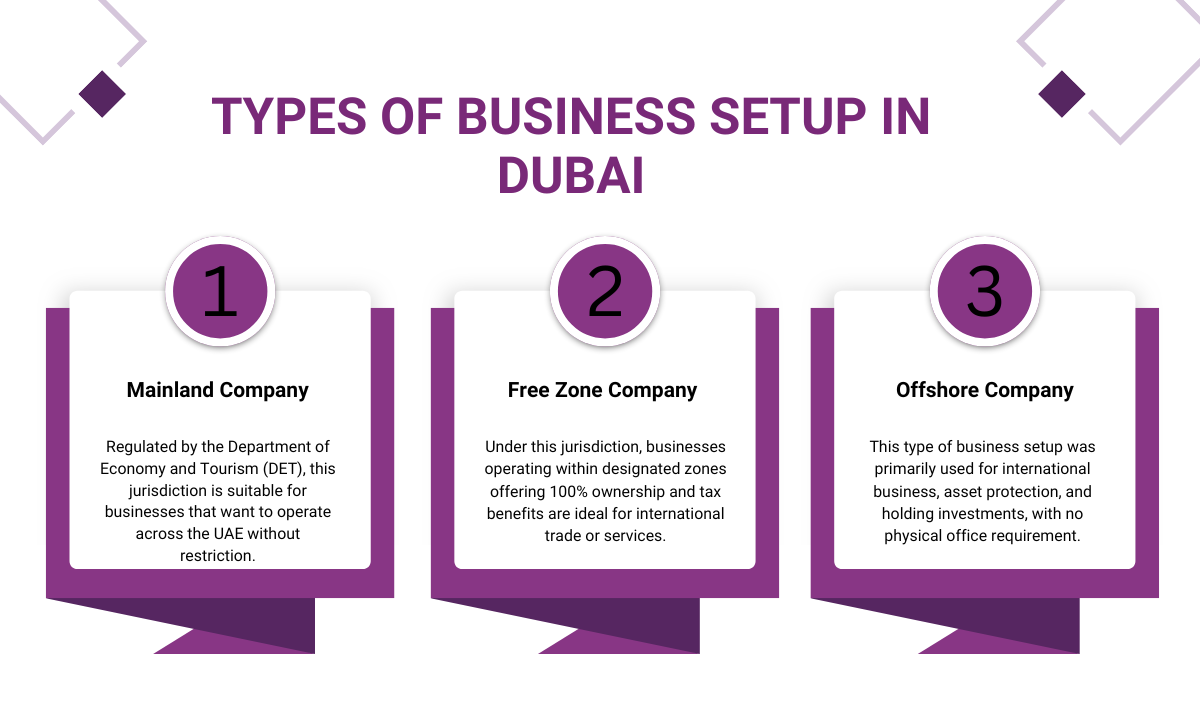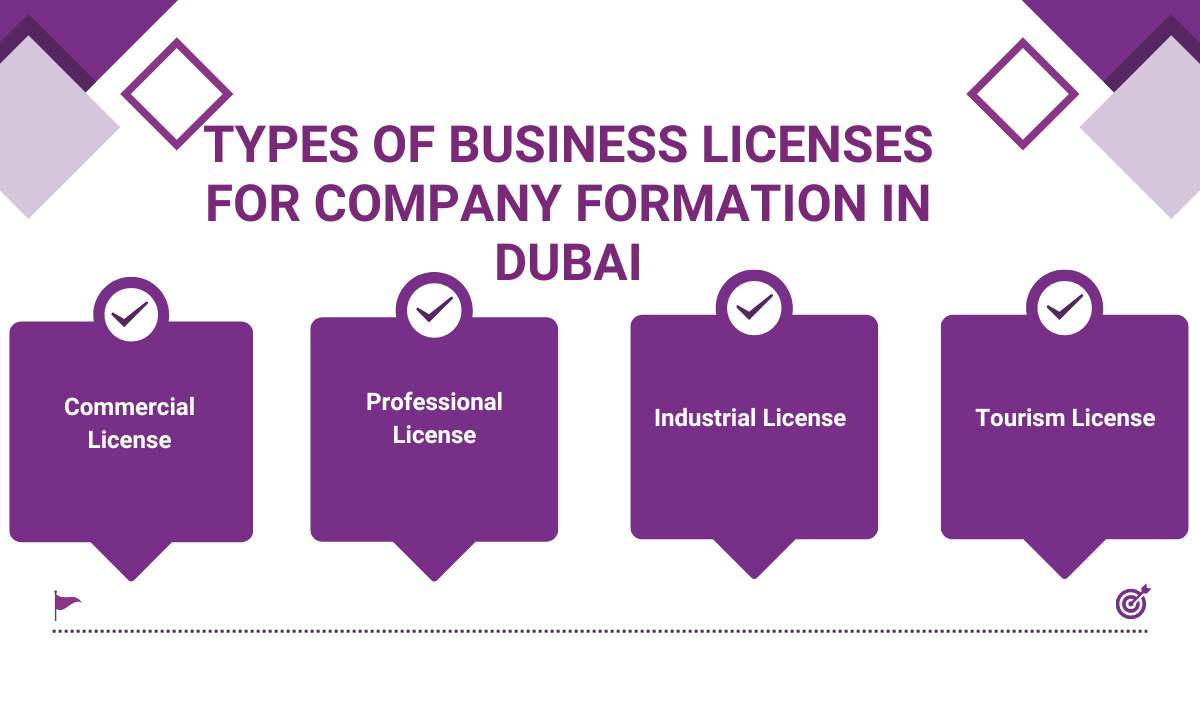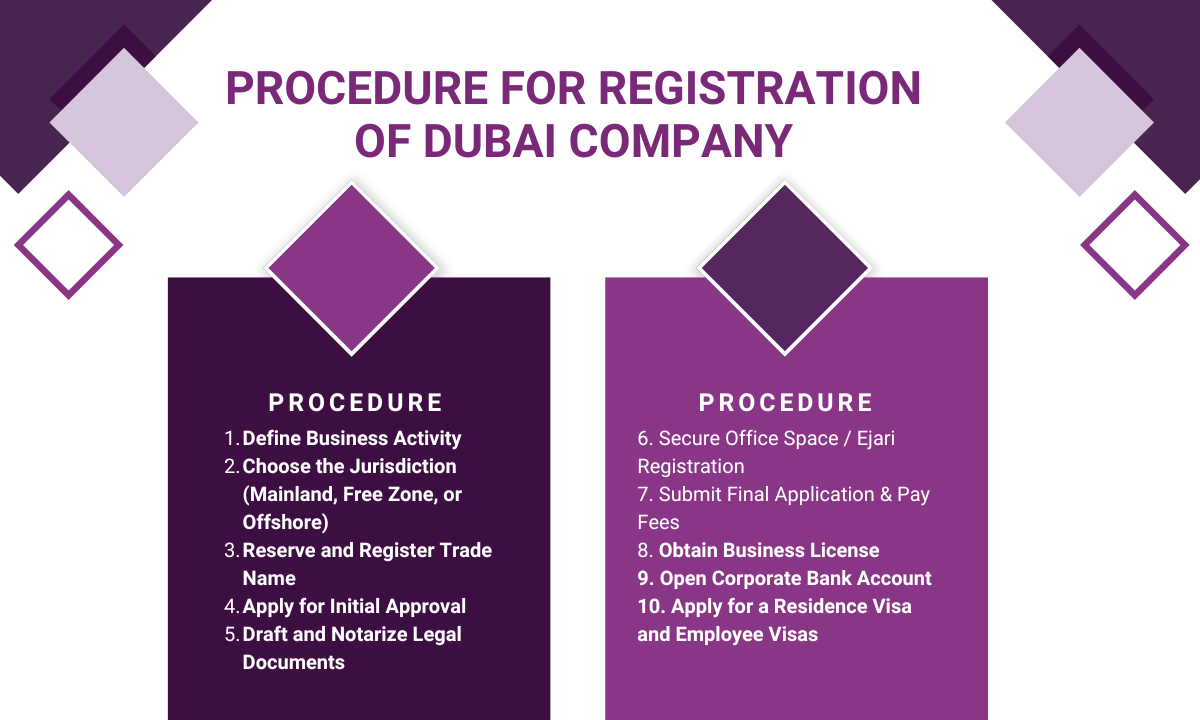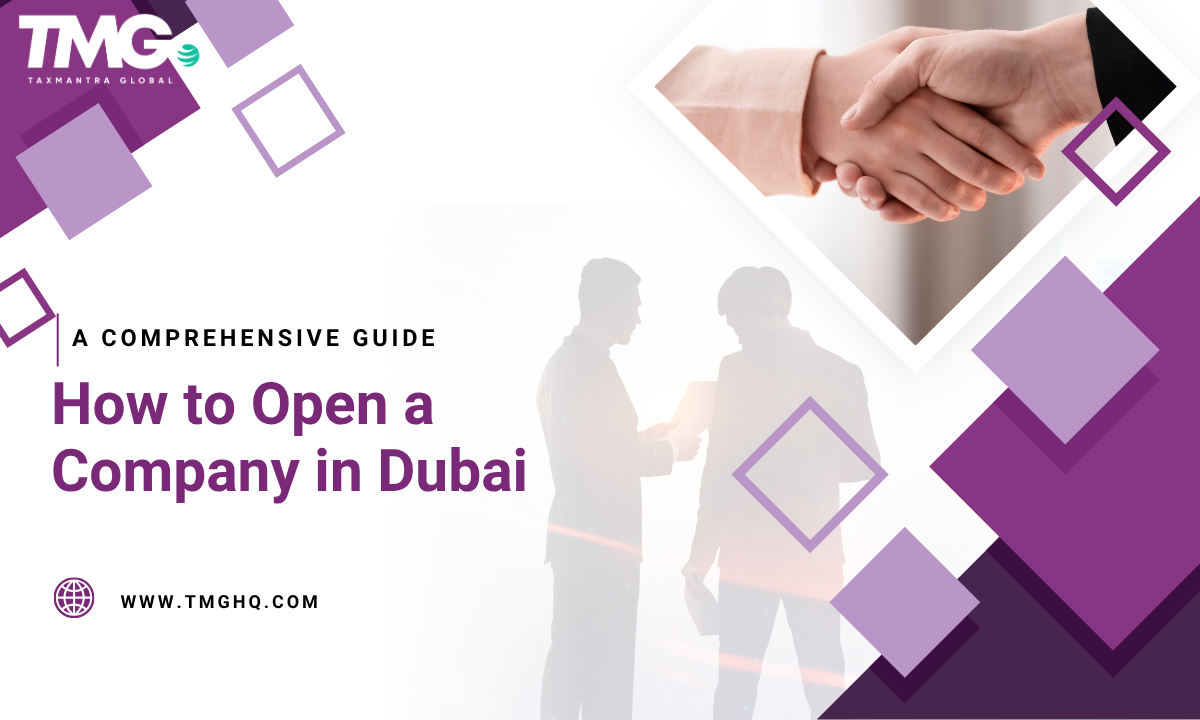How to Open a Company in Dubai – A Comprehensive Guide
With the ease of government regulation for conducting cross-border businesses, setting up a business in Dubai is an attractive opportunity for entrepreneurs and investors worldwide. With the presence of a lucrative geographic location, world-class infrastructure, favourable tax structure, and investor-friendly policies, Dubai has established itself as a global business hub. In this comprehensive guide, we’ll walk you through everything you need to know about how to open a company in Dubai. This ranges from registration procedures and license types to the benefits of different business zones and the documentation required. In addition to this, this blog will also highlight how taking assistance from Taxmantra Global will make the entire process of starting your own business in Dubai a piece of cake.
Business Setup in the United Arab Emirates
The economy of the United Arab Emirates (UAE) offers one of the most dynamic business environments in the Middle East. Comprising seven emirates, the UAE has streamlined and modernised its commercial laws to attract global investors. Among these emirates, Dubai stands out due to its diverse economy, modern infrastructure, ease of doing business, and openness to foreign investors.
Moreover, the UAE allows 100% foreign ownership in most sectors, with simplification in visa application and immigration processes. Furthermore, access to a massive international market makes it a lucrative position as a trade and logistics gateway between East and West.
Dubai Company Registration
The business setup in Dubai includes various steps, which require proper planning and support and keeping in mind the three primary jurisdictions in which a business can be established:
- Mainland (Onshore)
- Free Zone
- Offshore
The choice of jurisdiction depends on factors such as the nature of your business, ownership structure, required licenses, and operational needs.
Key Advantages of Establishing a Business in Dubai
Registering your dream business in Dubai involves the following advantages, which highlight why the Dubai market serves as a hotspot for business growth:
-
Lucrative Central Geographic Position
The geographic location of Dubai acts as the heart of major global trade routes, making it a perfect hub for international businesses. With easy access to markets across Europe, Asia, and Africa, companies can efficiently conduct regional operations and serve clients on multiple continents with ease. Moreover, the city’s strategic position offers exceptional connectivity, reducing both the time and cost involved in global trade.
-
Business-Friendly Environment
This part of the country is renowned for its pro-business climate, offering a streamlined approach to starting and managing a business. The city consistently ranks high for ease of doing business, with government departments working efficiently to provide quick and seamless services. Thus, with such a profitable environment, entrepreneurs can set up and operate businesses with speed and efficiency, which is a key advantage for those looking to enter fast-paced markets.
-
Attractive Tax Advantages
The tax structure in Dubai is one of the most favourable in the world, making it on the list of top searches of how to open a company in Dubai. The implication of zero-9% corporate tax, personal income tax, and capital gains tax makes it a highly attractive destination for businesses. In addition to this, these tax policies allow companies to retain more of their profits and reinvest them into further growth, making Dubai a prime location for startups and multinational corporations looking to maximise their financial returns. Furthermore, many free zones in Dubai offer additional tax exemptions and benefits, further enhancing the city’s appeal for initiating business operations.
-
State-of-the-Art Infrastructure
The infrastructure offered by the city is truly world-class, setting the stage for smooth and efficient business operations. Being home to some of the most advanced transport networks, including modern airports, seaports, and roads, makes logistics and supply chain management a breeze. Moreover, with connectivity at the highest level, businesses in Dubai can quickly reach both local and international markets, which reduces operational downtime and maximises efficiency.
-
Dynamic and Growing Economy
The overall economy of Dubai is among the most dynamic in the world and is driven by a combination of diversification and rapid growth. Traditionally involved in the oil sector, the city has successfully diversified into various sectors, including finance, real estate, tourism, technology, and trade.
This economic diversity offers multiple opportunities for businesses to thrive across various industries. Moreover, Dubai’s ability to innovate and adapt has helped it maintain resilience even during economic degradation, ensuring stability for businesses operating within the region.
-
Special Economic Zones and Free Zones
Dubai offers a number of special economic zones and free zones that provide significant incentives for businesses. These zones offer full foreign ownership, exemption from corporate and personal income taxes, and simplified regulatory requirements, which create an attractive environment for entrepreneurs and foreign investors.
Additionally, these free zones often come with flexible visa options, making it easier for businesses to recruit and retain international talent. This combination of benefits ensures businesses can thrive with minimal bureaucratic hurdles.
-
Comprehensive Support for Entrepreneurs
Dubai’s government is highly supportive of entrepreneurs, offering a range of services designed to foster innovation and business growth. From government-backed funding initiatives to mentorship programs and business incubators, entrepreneurs in Dubai have access to a robust support network that helps them bring their ideas to life.
Additionally, the UAE government regularly updates and revises policies to ensure a competitive environment that meets the needs of both new startups and established businesses.
Types of Business Setup in Dubai

Let’s understand the three primary types of business setups in Dubai:
- Mainland Company – Regulated by the Department of Economy and Tourism (DET), this jurisdiction is suitable for businesses that want to operate across the UAE without restriction.
- Free Zone Company – Under this jurisdiction, businesses operating within designated zones offering 100% ownership and tax benefits are ideal for international trade or services.
- Offshore Company – This type of business setup was primarily used for international business, asset protection, and holding investments, with no physical office requirement.
Each type serves different business models and objectives, which is why it is important to highlight them one by one:
Dubai Mainland Company Registration
A mainland company is licensed by the Dubai Department of Economy and Tourism (DET). Under this jurisdiction, businesses here can operate anywhere within the UAE and internationally. Earlier, foreign investors needed a local sponsor to own 51% of the shares, but recent reforms now allow 100% foreign ownership in most sectors.
Key features:
- Unlimited market access across the UAE
- Eligibility for government contracts
- No limit on the number of visas
- Office space mandatory
Applicable for Industries:
Retail stores, restaurants, logistics, consultancies, construction companies, etc.
Dubai Free Zone Company Registration
Dubai is home to more than 30 Free Zones, each catering to specific sectors like IT, media, healthcare, finance, and logistics. These zones are designed to attract foreign investment by offering simplified procedures and incentives.
Key Features:
- 100% foreign ownership
- Full repatriation of profits and capital
- Tax exemptions (VAT may still apply)
- Streamlined customs procedures
- No import/export duties within the zone
Applicable for Industries:
E-commerce, tech startups, service-based businesses, and trading companies.
Dubai Offshore Company Registration
If you are looking for how to open a company in Dubai that will operate outside the geographical boundaries, offshore company structures are ideal. Offshore companies are legally established entities that operate outside the UAE but are registered in designated offshore jurisdictions like Jebel Ali Free Zone (JAFZA) or Ras Al Khaimah (RAK).
Key features:
- No physical office requirement
- 100% ownership
- Asset protection
- Confidentiality and privacy
- Ideal for international holding companies
Applicable for Industries:
Investment holding, global trade, asset management, intellectual property holding.
Types of Business Licenses for Company Formation in Dubai

Every business setup in Dubai must operate under a valid trade license issued by the relevant authority, which can be the Department of Economy and Tourism (DET) for mainland companies or the respective Free Zone authorities. The type of license you choose defines the scope of your business activities, regulatory obligations, and applicable compliance requirements.
Let’s understand the four main categories of business licenses in Dubai:
1.Commercial License
A Commercial License is issued to businesses engaged in buying, selling, importing, exporting, or trading of goods and commodities. Whether you’re dealing in general trading, specific products like electronics, automobiles, textiles, or even e-commerce goods, this is the license you’ll need.
Common Activities Involved Under Commercial License:
- General Trading (multi-product wholesale or retail)
- Vehicle trading (automobiles, spare parts)
- Real estate brokerage
- Logistics and distribution services
- Import/export of goods
- E-commerce and online stores
Ideal for businesses catering to:
- Retail shops
- Wholesale traders
- E-commerce platforms
- Import-export businesses
- International trade companies
2.Professional License
The professional license is issued to individuals or companies offering services, consultancy, or skilled expertise. This license covers non-commercial activities where intellectual capabilities or professional skills are the key deliverables.
Unlike commercial licenses, a professional license allows 100% foreign ownership, even in mainland setups, subject to certain conditions. Thus, this makes it an attractive option for solo entrepreneurs or service-based enterprises.
Common Activities Under Professional License:
- Legal consultancy
- IT services and software development
- Management or HR consultancy
- Marketing agencies
- Education and training services
- Design studios and freelancers
- Medical professionals (clinics, dental practices)
- Accounting and auditing firms
Ideal for businesses catering to:
- Independent consultants
- Service providers
- Freelancers
- Technical and creative professionals
3.Industrial License
An Industrial License is required for businesses that are involved in manufacturing, processing, assembling, or fabricating products. This license is heavily regulated and involves coordination with various government departments, including environmental and industrial authorities.
It typically applies to a business setup in Dubai that will set up factories, warehouses, or production units in designated industrial zones.
Common Activities Under Industrial License:
- Food and beverage manufacturing
- Textile and garment production
- Metal fabrication
- Plastic moulding and recycling
- Packaging and bottling
- Furniture production
Ideal for businesses catering to:
- Manufacturers
- Industrial enterprises
- Production and assembly plants
4.Tourism License
Given Dubai’s booming hospitality and tourism sector, a tourism license is required for companies engaged in travel, tourism, event management, and hospitality services. These licenses are issued by the Department of Tourism and Commerce Marketing (DTCM), along with the DET or relevant Free Zone.
Dubai remains one of the most visited cities in the world, making this license highly attractive to businesses targeting tourists and visitors.
Everyday Activities Under Tourism License:
- Travel agencies (inbound/outbound tourism)
- Tour operators and desert safari companies
- Hotel and resort management
- Event and exhibition organisers
- Cruise and yacht rental services
- Tourism-related transport
Ideal for businesses catering to:
- Tour operators
- Event management companies
- Travel consultants
- Destination management companies
5.Optional/Hybrid Licenses and Activity Permits
While the above four licenses cover most business needs, the flexible licensing regime also allows hybrid or activity-specific permits for more critical business setups in Dubai.
Some of the examples include:
- Freelance Permit: For independent professionals in fields like media, tech, and education (mostly in Free Zones like Dubai Media City or Dubai Internet City).
- Dual License: This allows Free Zone companies to operate on the mainland with DET approval.
- Green License: A newer license was introduced to support sustainable and environmentally friendly businesses.
- Innovation or Tech License: This license is offered by specific Free Zones for startups and R&D-based businesses.
What to Consider While Choosing the Right License?
Selecting the appropriate license is not just a formality; it determines the legal structure of your business, your operational limits, and your ability to hire or scale. This makes it important to know it prior to understanding how to open a company in Dubai.
Here are key factors to consider:
- Nature of your business activities – compare trading vs consulting vs manufacturing.
- Your target market – whether to choose UAE-based clients or international customers
- Ownership preferences – comparing between 100% foreign ownership vs. local partnership
- Visa requirements – understanding number of staff, partners, dependents
- Cost of licensing and renewal
- Office space and operational needs
If your business involves multiple activities across categories, e.g., consulting and product sales, you may need to apply for a dual license or multiple licenses.
What Documents Are Required for Business Setup in Dubai?
Though documentation may vary based on what structure and jurisdiction you choose for your business setup in Dubai, here’s a general list:
- Passport copies of shareholders and directors
- Visa and entry stamp (if applicable)
- Proof of residence (e.g., utility bill)
- Proposed trade name (3-5 options)
- Memorandum of Association (MoA)
- Articles of Association (AoA)
- Business plan (in some Free Zones)
- Initial approval from relevant authorities
- Lease agreement (Ejari) for office space (if required)
Moreover, some free zones also require financial projections and NOC (No Objection Certificate) if the applicant is on an existing UAE visa.
Procedure for Registration of Dubai Company

The process involving how to open a company in Dubai is a structured and regulated process that ensures compliance with the UAE’s legal and commercial framework. Although the steps may vary slightly depending on whether you’re setting up a Mainland, Free Zone, or Offshore company, the following comprehensive breakdown applies broadly across all structures with specific nuances.
1. Define Business Activity
Before initiating the registration process, clearly identify the nature of your business activities. Dubai authorities require you to specify what your company will be doing, as this determines:
- The type of license you will need, i.e. commercial, professional, or industrial.
- The applicable regulatory body or Free Zone.
- Whether external approvals from other authorities like the Health Department, RTA, or KHDA are required.
Moreover, Dubai allows multiple activities under one license, provided they fall under compatible categories. Thus, it is important to properly classify how you can avoid legal or operational issues later.
2. Choose the Jurisdiction (Mainland, Free Zone, or Offshore)
For a business setup in Dubai, selecting the right jurisdiction is vital as it impacts ownership, operational freedom, cost, visa eligibility, and tax benefits.
-
Mainland:
This jurisdiction allows operation anywhere in the UAE and internationally. Ideal for retail, construction, and service businesses targeting local UAE markets.
-
Free Zone:
Under the Free Zone setup, it offers 100% foreign ownership and tax advantages. Ideal for international trade, tech, or consultancy businesses.
-
Offshore:
No physical presence is needed. Ideal for holding companies, asset management, or international trade with confidentiality.
Thus, once selected, the jurisdiction governs the legal authority you’ll interact with, e.g., DED for the mainland or the respective Free Zone authority.
3. Reserve and Register Trade Name
In this next step, you must determine your company name to be unique and relevant and must follow the naming conventions set by UAE authorities. To avoid any delays, ensure to submit 3–5 options for your trade name for easy approval.
Rules to follow while choosing a name:
- Avoid offensive or religious words.
- The name should reflect the business activity (optional but recommended).
- Use of personal names is allowed only if it’s the full name (first + last).
- Certain suffixes like LLC, FZE, or LTD are mandatory depending on company type.
Moreover, it takes 24-48 hours for this application to show the result of approval unless it requires any special application.
4. Apply for Initial Approval
The Initial Approval Certificate is a no-objection document from the relevant authority that confirms the UAE government has no objection to you setting up your company.
Required documents typically include:
- Passport copies of shareholders and managers
- Business plan in some Free Zones
- Name reservation certificate
- Brief description of business activities
It is important to note that the Initial approval is valid for 6 months and is non-renewable, allowing you to proceed with the legal documentation and office setup.
5. Draft and Notarize Legal Documents
This stage involves preparing the Memorandum of Association (MoA) and/or Articles of Association (AoA), depending on your business structure.
- Mainland: The MoA must be notarised by a UAE notary public.
- Free Zone: The Free Zone authority may have a standard MoA template, which can be signed in their presence.
Key contents of MoA/AoA:
- Shareholding structure
- Capital contribution
- Voting rights
- Profit and loss distribution
- Powers and responsibilities of partners or directors
6. Secure Office Space / Ejari Registration
Having a physical address for your business setup in Dubai is a legal requirement in the UAE. Thus, it is crucial to obtain a commercial office space or a virtual office, depending on the zone, before license issuance.
- Mainland: If you choose this jurisdiction, you must register a tenancy contract through Ejari, the official rental agreement system in Dubai.
- Free Zones: Many offer flexi-desk or co-working space solutions to reduce setup costs.
How does office space impact?
- Number of visas you can sponsor
- Regulatory approvals
- Business credibility and operational feasibility
A bonus tip would be to choose a location based on proximity to your clients, industry hubs, or logistic access like ports and airports.
7. Submit Final Application & Pay Fees
Once all documents are ready and office space is secured, you submit the final application to the relevant authority, Department of Economy and Tourism, Free Zone authority, or Offshore registrar, depending on what jurisdiction you have chosen.
You will also pay the registration and license fees at this stage, which may vary based on jurisdiction, business activity, and license type.
8. Obtain Business License
After verification and processing, the authority will issue your business license, which legally allows your company to operate in Dubai. Moreover, ensure to renew your license annually, as failure to do so may result in fines or hefty penalties.
9. Open Corporate Bank Account
With your company officially registered, the next step is to open a corporate bank account in the UAE. This process has become stringent due to the implementation of international anti-money laundering laws.
Your banks may require the following documents:
- Trade license
- MoA
- Shareholder documents
- Proof of residence
- Office lease agreement
- Business plan or cash flow forecasts
Some banks conduct due diligence and may request an in-person interview with the shareholders. Thus, this intricacy can be avoided if you can seek professional assistance to identify the right bank and prepare the required documents thoroughly. Moreover, please note that this process may take anywhere from 1 to 4 weeks.
10. Apply for a Residence Visa and Employee Visas
Being the final step on how to open a company in Dubai, once the company is formed, you are eligible to apply for UAE residence visas under your company sponsorship for yourself, your employees, and your family members.
Visa quotas are typically determined by the office size and jurisdiction; Free Zones provide a specific number of visas per package or office size. At the same time, mainland companies can request unlimited visas, subject to approval from the Ministry of Labour and immigration departments.
How Does Taxmantra Global’s Intervention Help in Business Setup in Dubai?
The process involving business setup in Dubai can be complex dealing without the right guidance. This is where Taxmantra Global (TMG) plays a vital role. With years of international experience in company incorporation, legal structuring, tax planning, and compliance, TMG offers a one-stop solution for entrepreneurs and enterprises aiming to establish a presence in the UAE.
Here’s how Taxmantra Global can add value:
- Jurisdiction Analysis: We will help you choose the right setup, whether Mainland/Free Zone/Offshore, based on your goals.
- End-to-end Incorporation: We cater to end-to-end solutions from trade name approval to license issuance and bank account setup.
- Legal & Compliance Advisory: From drafting MoAs’ legal filings to ensuring regulatory compliance, we are with you at every step.
- Tax Optimisation: We impart spot-on strategic advice on corporate tax, VAT, and international taxation.
- Post-Incorporation Support: We also offer services such as visa processing, accounting, auditing, and ongoing compliance services.
Our deep understanding of both UAE regulations and cross-border tax implications makes them a reliable partner for long-term business success.
Final Thoughts
Dubai remains one of the most attractive business destinations in the world. Its liberal economic policies make it ideal for entrepreneurs and investors to show interest in how to open a company in Dubai.
Whether you want to start a trading company, consultancy firm, tech startup, or a holding company for international operations, Dubai has a structure to suit your needs. However, success lies in choosing the right setup, understanding the legal requirements, and navigating the procedural landscape effectively.
With expert partners like Taxmantra Global by your side, the process becomes seamless and risk-free. Our guidance can help you focus on your core business while they manage the legal and regulatory frameworks.
Tags: Business in Dubai, Business Setup in Dubai, Business Setup in UAE, Dubai Business Setup, Dubai Company Registration, Dubai Free Zone Company Registration, Dubai Mainland Company Registration, Dubai Offshore Company Registration, Key Advantages of Establishing a Business in Dubai, Procedure for Registration of Dubai Company, Types of Business Licenses, Types of Business Licenses for Company Formation in Dubai, Types of Business Setup in Dubai, What Documents Are Required for Business Setup in Dubai?


